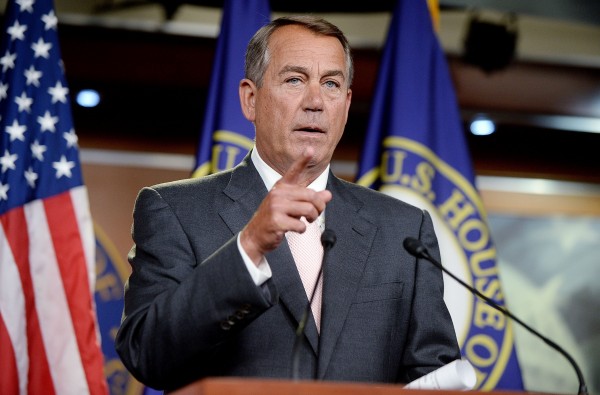Obama’s Iranian Policy: A Threat to America and Israel

Olivier Douliery
(Courtesy of Oliver Douliery/Acaba Press via TNS)
February 11, 2015
At the beginning of January, President Barack Obama met with Senate Democrats in Baltimore for the Senate Democratic Issues Conference. The main highlight from this meeting was the “sparring match” between President Obama and Senator Robert Menendez (D-NJ). Menendez is a co-sponsor with Senator Mark Kirk (R-IL) of a bill that would impose further sanctions on Iran if no deal is reached by the extended June 30 deadline for negotiations over its nuclear program. Obama implicitly stated that imposing more sanctions on Iran prior to June 30 could result in the Iranians pulling out of negotiations. Thus, the international community may blame the United States, rather than the Iranians, for the lack of a nuclear deal. Obama then also implied that the pressure for this bill was coming from political donors rather than the senators themselves, which resulted in a poor reaction from Menendez who has been working to curb the Iranian nuclear program for two decades.
The Menendez-Obama showdown and the nuclear negotiations have coincided with Speaker of the House, John Boehner’s (R-OH) invitation Israeli Prime Minister Benjamin Netanyahu to speak in front of Congress about the threat of Iran on March 3. Obama has requested that Netanyahu’s speech in front of Congress be cancelled and refused to meet with Netanyahu. This outward preference of Iran, a theocratic dictatorship, comes on the heels of the Obama Administration’s absence from the recent rally in Paris after the Islamic terrorist attacks, which targeted Jews in France.
Much of the international community has penalized Iran’s indiscretions through economic sanctions. The strict sanctions on Iran are responsible for crippling their economy and forcing them to come to the negotiating table, which is a positive effect. On the other hand, sanctions have crippled the Iranian oil market, which makes up most of the nation’s economy, and this has caused their GDP to shrink.
Iran’s Supreme Leader, Ayatollah Ali Khamenei, must choose between nuclear proliferation and the security of his regime. So more sanctions could mean a quicker resolution to the Iranian nuclear program, but they could also result in a further economic slip for Iran and more suffering for the Iranian people. All wars have casualties, but the Iranian people who voted for a moderate president, Hassan Rouhani, in hopes of fixing the failing economy and mending relations with Western powers, should not necessarily suffer because of their uncooperative leadership. Unfortunately, there is no way to separate the two. Unless Iranian leaders make concessions at the negotiating table, the Iranian people are bound to suffer as more sanctions most likely will and should be put into place. The upside of further increasing sanctions is that they could potentially topple the theocratic regime of the Ayatollahs and give Iran a true democracy, which could potentially open up communication between Iran and the Western world.
But is Iran willing to work with us?
Iran has openly targeted the United States and Israel by stating that the state’s goal is to annihilate both countries; Iran has gone as far as to openly target Netanyahu’s children. It is no secret that Obama is not a fan of Netanyahu or that he has turned his back on Israel and the global Jewish population. But why have Democratic leaders and the President chosen to stick Netanyahu and Israel in the corner and give Iran a chance?
Some believe the changing political atmosphere in the Middle East calls for a change in America’s approach. We have recently seen many regimes in the Middle East topple, some of which were put into power by the U.S. and our allies. The sun setting on the regimes of Qaddafi and Mubarak does not necessarily mean that the sun is rising in Iran where things have remained status quo.
Obama has long been labeled as a “lame duck,” but it seems that he is trying to further promote his legacy through potentially detrimental policy changes. Hallmarks of his presidency include attempting to destroy diplomatic relationships with Israel, “ending” the wars in Iraq and Afghanistan, emptying out of the Guantanamo Bay detention camp (GTMO), opening democratic relations with Cuba and now diplomacy with Iran. The ripple effects from most of these decisions could be potentially catastrophic.
We are witnessing a power vacuum in the Middle East in which a jihadist group is consistently gaining more territory in which there is a lack of United States troops. Afghanistan is still vulnerable to the Taliban and our president is releasing jihadist Taliban prisoners from GTMO. And now Obama is crying for diplomacy with Iran in regard to their nuclear potential when in May, Khamenei pledged to destroy the U.S. through “battle and jihad.” Obama’s reckless policy shifts might look wonderful in the short run, but the long-term effects of the choices he is making are quite possibly insurmountable. Five years from now, President Obama will be working on his book deal and a future president might very well be dealing with an Islamic Caliphate and an Iran with nuclear warheads, frightening and potential consequences of Obama’s actions.











